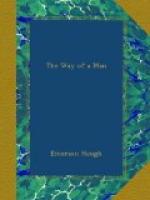CHAPTER XLIV
THIS INDENTURE WITNESSETH
Within the few days following the battle, the newspapers paused in their warnings and rebukes on the one side, their paeans of victory on the other, and turned to the sober business of printing the long lists of the dead. Then, presently, each section but the more resolved, the North and South again joined issue, and the war went on.
As for myself, I was busy with my work, for now my superiors were good enough to advance me for what they called valor on the field. Before autumn ended I was one of the youngest colonels of volunteers in the Federal Army. Thus it was easy for me to find a brief furlough when we passed near Leesburg on our way to the Blue Ridge Gap, and I then ran down for a look at our little valley.
The women now were taking ranks steadfastly as the men. My mother greeted me, and in spite of all her sorrow, in spite of all the ruin that lay around us there, I think she felt a certain pride. I doubt if she would have suffered me to lay aside my uniform. It hung in our home long after the war was ended, and my Quaker mother, bless her! kept it whole and clean.
There were some business matters to be attended to with our friend Dr. Samuel Bond, who had been charged to handle our estate matters during my absence. He himself, too old and too busy to serve in either army, had remained at home, where certainly he had enough to do before the end of the war, as first one army and then the other swept across Wallingford.
I found Doctor Bond in his little brick office at the top of the hill overlooking the village. It was he who first showed me the Richmond papers with lists of the Confederate dead. Colonel Sheraton’s name was among the first I saw. He had been with Cumming’s forces, closely opposed to my own position at Bull Run. He himself was instantly killed, and his son Harry, practically at his side, seriously, possibly fatally wounded, was now in hospital at Richmond. Even by this time we were learning the dullness to surprise and shock which war always brings. We had not time to grieve.
I showed Doctor Bond the last writing of Gordon Orme, and put before him the Bank of England notes which I had found on Orme’s person, and which, by the terms of his testament, I thought might perhaps belong to me.
“Could I use any of this money with clean conscience?” I asked. “Could it honorably be employed in the discharging of the debt Orme left on my family?”
“A part of that debt you have already caused him to discharge,” the old doctor answered, slowly. “You would be doing a wrong if you did not oblige him to discharge the rest.”
I counted out and laid on the desk before him the amount of the funds which my father’s memoranda showed had been taken from him by Orme that fatal night more than a year ago. The balance of the notes I tossed into the little grate, and with no more ado we burned them there.




